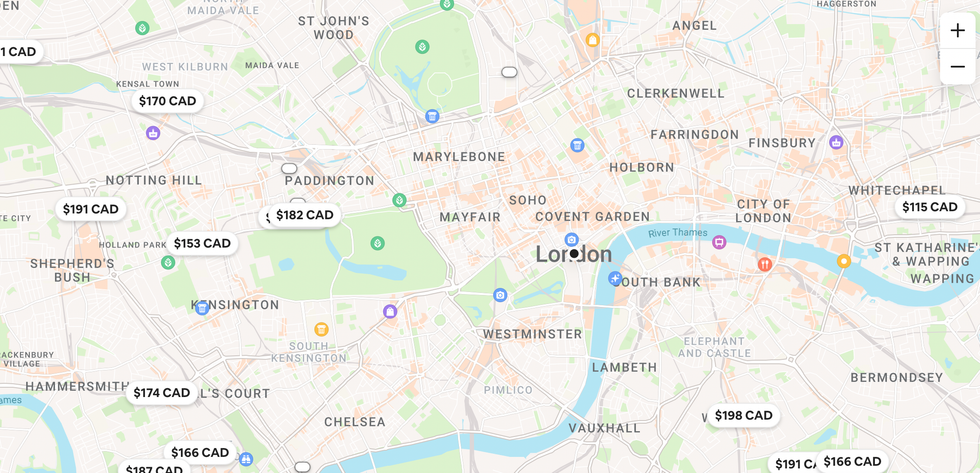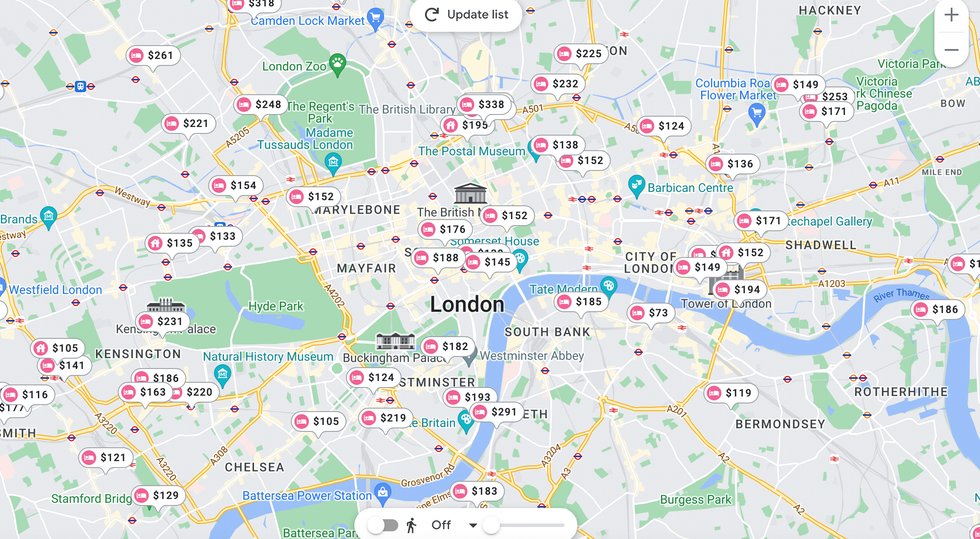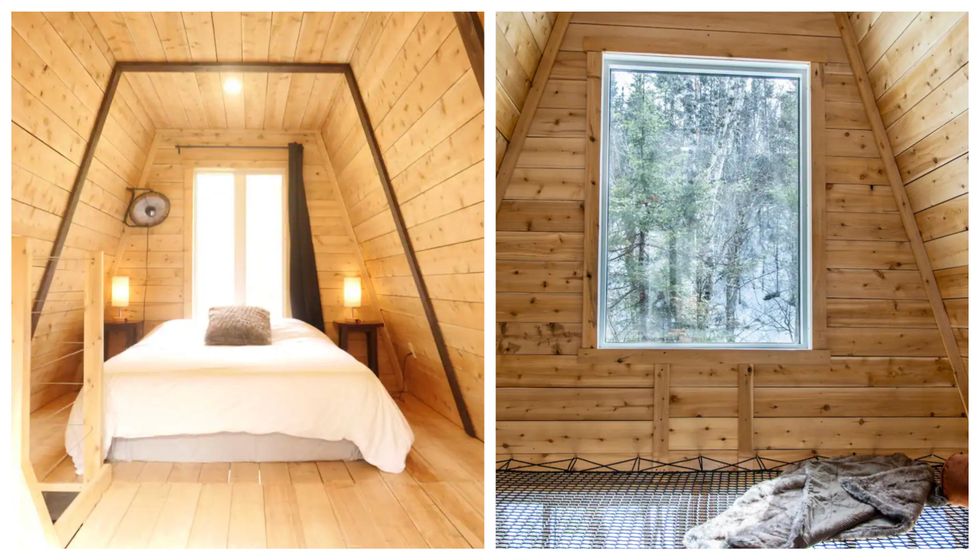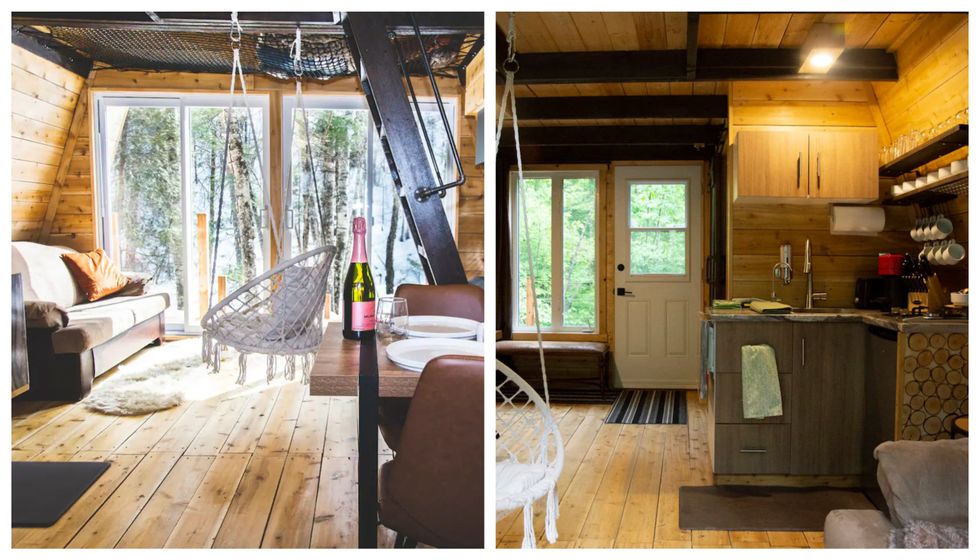While booking my upcoming Europe trip though, I had a moment that made me question my ways.
As I searched for Airbnbs in London and Berlin, I was left deflated by the prices, and nervous about which neighbourhood to choose. Inspiration struck and I decided to search "hotels in London," and my whole itinerary became easier.
Hotels are made with travellers in mind, so they were all bunched together on the map, indicating to me that it was in a good area for sightseeing. Also to my great surprise, rooms for two had basically the same price tag as the Airbnbs in the city.
It made me question my vacation tactics, and it turns out that I'm not the only one.
Is it a myth that Airbnb is easier?
Sometimes your Airbnb host will give you a code to the place, and you seamlessly come and go with little to no communication needed. These blissful trips are rewarded with five stars and no new grey hairs, but they don't always happen.
The thing about Airbnb is that every place and every host is different. I mean, that's literally the whole point, and one that I appreciate sometimes when I can experience cool new places with different vibes. I love seeing a little slice of someone else's life, and you can really get that with Airbnb.
I mean, I've yet to see a hotel that looks like it should be in Middle-earth.
On the flip side, there's no real standardization when it comes to the check-in process. I've had some places where the host will meet you with a key, which gets especially complicated when you have delayed flights and no cell phone plan abroad. Scheduling the timing for these in-person key hand-offs isn't ideal.
Then there have been the lockboxes with keys inside and frustratingly unclear instructions on how to access them. If you have a host that's slow to respond, this can result in hours sitting with your suitcase on the sidewalk.
While reviews can be a helpful way to give you a heads-up about a complex check-in process, you just know exactly what you're getting with a hotel. You walk in, go to the counter, get your handy little key card, and that's it.
Need recommendations? Call down to the front desk or concierge. Dry-cleaning? They might price-gouge you, but it'll get done. Craving dessert? Room service.
Hotels are just convenient, making me question why I thought of Airbnb as the "easier" option for so long.
Is the charm of Airbnb dwindling?
I recently took a trip with friends to Victoria, B.C., and rented an Airbnb in an apartment building. After a few elevator trips with fellow vacationers, we realized that many of the apartments were Airbnbs.
When we had a few questions about the apartment, we reached out to the host and got someone new each time, since it was a company that ran it. They were all friendly, efficient, and helpful, but I realized then that one of my favourite parts of Airbnb was missing — the people.
To me, what distinguished the site from traditional hotels was that there were real homeowners renting out their spaces, adding a personal touch and a unique flair to the experience. I loved arriving at my Airbnb and seeing a little list from my host with all the local recommendations, or just having a friendly interaction with them if I needed anything.
The best Airbnbs were the ones with that connection. Our one in Italy that was the host's old family home, or the apartment in Greece run by a guy who greeted guests with his mother's homemade cake — they came with stories, and that felt special.
You can definitely still get that experience, but if bigger companies are just buying up homes and turning them into Airbnbs, how is that really different from a hotel?
When asked, Airbnb told Narcity that companies buying up condos to rent on the site "is not a trend." "The vast majority of Airbnb hosts in Canada share just one home and entire home listings represent less than 1% of the country’s overall housing supply," they said.
So it might be worth just taking that extra step and looking into who your host is if you want to support individuals as opposed to rental companies.
In one you get housekeeping, in the other, you have to do the chores
On a group trip, whoever booked the Airbnb (and is defending their 5-star rating) suddenly turns into a drill sergeant in the last few hours, ordering everyone to strip the beds, leave the towels in the washer, scrub all the dishes, and leave no trace.
I've never minded doing some simple tasks and leaving the home tidy, of course, but I do start to prickle when the list of cleaning to-dos gets long and I'm paying a hefty cleaning fee on top of it.
Apparently, this happened enough that Airbnb's CEO and co-founder, Brian Chesky, announced that guests should not have to do "unreasonable checkout tasks."
Additionally, the company changed its policy to show additional fees, such as a cleaning fee, upfront. Airbnb told Narcity that "guests can now view checkout instructions on the listing page before booking, and they’ll receive a reminder before they leave the home."
Still, in hotels, you're often getting daily housekeeping services included in your price, not as an extra charge.
Location, location, location
What sparked this whole epiphany for me was staring at an Airbnb map of London, with overpriced apartments scattered throughout the large city.
After I determined the prime tourist areas — which I wanted to be in since I only have two days there — I tried to narrow down my Airbnb search.
I found that there were fewer options in these locations at my price point, especially with the "entire place" filter set, since I didn't want to share a space.
Although it wasn't what I wanted, Airbnb does offer room rentals, which are cheaper. You can select the Rooms category on the site and see private room stays. Airbnb said that "last year, more than 80 percent of private rooms were under $100/night, with an average rate of $67/night."
For me though, I wanted to have my own space, which limited my options in the city.
 Airbnb map with select filters. Airbnb
Airbnb map with select filters. Airbnb
Comparing it to Google's hotel map, it was clear which had better options in this city.
 Google hotel map with select filters. Google
Google hotel map with select filters. Google
Obviously, it depends on the city you're visiting and where you want to stay, but generally, hotels are pretty centrally located. This could be a negative for someone wanting to stay on the outskirts of a city or in a smaller town though, in which case Airbnb will most likely have much more options.
This whole trip planning experience has shown me that it's just worth checking hotel options and comparing them to Airbnb, to see what works best for the trip.
Costs
Another assumption I always made was that hotels are more expensive.
Hotels are expensive, no doubt, but Airbnb can be too (as shown above). This really depends on the place you're visiting and how many people you have in your group, though.
For my upcoming trip, I was surprised that I could get a hotel room for two people for around the same price as an Airbnb in London. Plus, it would be in a better area for me.
If your group gets bigger than two, then Airbnb is definitely the way to go. Big groups travelling need more space, so renting out a home on Airbnb and splitting the cost rather than everyone getting individual hotel rooms can save you big time.
In a statement to Narcity, an Airbnb spokesperson said that "people come to Airbnb because they’re looking for value, whether a private room on a budget or a place to stay with a group of friends or the whole family."
The takeaway? Do your research and compare prices wherever you're going.
Cooking is nice, but I travel for the food
The other main perk of Airbnb? Kitchens.
Every time I travel somewhere, I think about how much money I'll save getting a place with a kitchen. Spoiler alert: Money is rarely saved.
 Morgan Leet at a restaurant.Morgan Leet | Narcity
Morgan Leet at a restaurant.Morgan Leet | Narcity
For a longer trip, I tend to cook more, but the reality is that I want to try out restaurants wherever I'm visiting. Kitchens come in handy for quick breakfasts, but for that, I can make a hotel room mini-fridge/kettle combo work fine.
Depending on the trip, I usually am not using that kitchen as much as I thought I would.
It's not all bad for Airbnb
By no means am I anti-Airbnb now, but I have come to see the value in hotels. You can still find amazing Airbnbs with equally amazing hosts, which I think outshine what most hotels can offer.
If I only have a few days to explore a city though, I'm probably bunking up at a centrally located hotel and enjoying the complimentary robe and slipper life.
If I want a super unique stay or to shack up somewhere like a local, I'm heading to Airbnb.
All in all, it depends on the trip — but I'm definitely giving hotels some more credit going forward.







 Airbnb map with select filters.
Airbnb map with select filters.  Google hotel map with select filters.
Google hotel map with select filters.  Morgan Leet at a restaurant.
Morgan Leet at a restaurant. Devant du chalet.
Devant du chalet. Chambre.
Chambre. Cuisine et salon.
Cuisine et salon. Extérieur.
Extérieur.